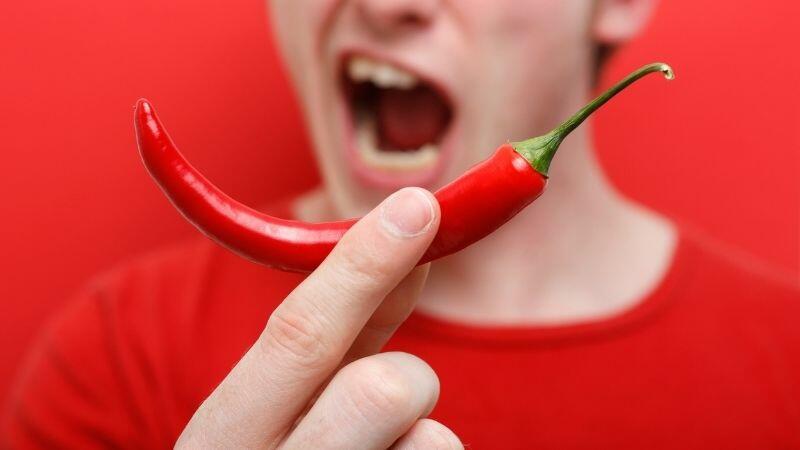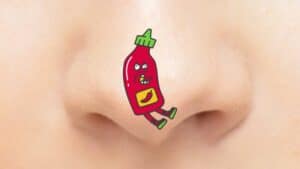Imagine taking a sip of water and instead of refreshing coolness, your mouth burns like you just ate a chili pepper. Or munching on a bland cracker that suddenly tastes like fiery hot sauce.
If familiar foods start tasting unbearably spicy for no apparent reason, something odd is going on.
The issue is unlikely with your tastebuds themselves. Rather, it originates in the nerves that transmit taste, your brain’s perception, or factors like medications and health conditions.
You see, spiciness is not technically a “taste” in the traditional sense. The hot sensation comes from special receptors that detect irritants and heat.
So when foods taste strangely spicy, it’s not your papillae gone rogue. The problem likely lies in how your body and brain are interpreting flavor signals.
This article will explore potential medical causes like:
- Nerve disruption
- Respiratory infections
- Hormonal changes
- Side effects of medication
And when to see a doctor about suddenly amplified levels of
While annoying, abnormal spicy sensations often have an underlying trigger. Identifying and addressing that root cause can help restore your tastebuds and let you enjoy the proper flavors again.
It’s Not Just Your Tastebuds
First, don’t blame your tastebuds. When flavors turn fiery for no reason, the issue lies deeper than your papillae.
See, spiciness isn’t technically a “taste” like sweet, sour, salty, bitter, and umami. The hot sensation comes from special receptors that detect irritants and temperatures.
So when everything tastes hot and spicy, your tastebuds are fine. The problem likely originates in your nerves or brain perception.
Why Our Mouths Sense Spiciness
To understand why plain food tastes spicy, we need to know how spiciness works in the first place.
The burning feel comes from chemicals called capsaicinoids found in chili peppers. When eaten, they bind to receptors in your mouth and throat that detect heat and pain, called nociceptors.
This triggers inflammatory effects that your brain reads as “hot” and “spicy.”
Certain neurons also help transmit and amplify spicy sensations to the brain through pathways like the trigeminal nerve.
If something malfunctions along this “spicy sensor” pathway, neutral foods may come across as fiery hot for no reason at all.
Medical Causes of Increased Spice Perception
Here are some specific health issues that could make everything taste unpleasantly spicy:
❌ Oral Nerve Damage
Damage to nerves in the mouth can cause false sensations of burning, tingling, or numbness. Foods eaten may take on those qualities.
❌ Medication Side Effects
Some prescription drugs like antibiotics, blood pressure meds, and antidepressants list altered taste perception as a side effect.
❌ Respiratory Infections
When nasal passages swell from colds or sinusitis, smell is impaired, and foods seem to taste differently.
❌ Dry Mouth
Saliva helps moderate spiciness. With reduced saliva from medication side effects or health conditions, spicy qualities intensify.
❌ Gastroesophageal Reflux Disease (GERD)
Stomach acid backing up into the esophagus can irritate taste receptors and amplify spicy sensations.
❌ Pregnancy Hormones
Hormone changes during pregnancy alter taste and smell, sometimes making foods taste unpleasantly spicy.
❌ COVID-19
Loss or distortion of taste is a common COVID symptom. Foods may take on a rancid, bitter, or spicy character.
❌ Menopause
Hormone fluctuations from perimenopause and menopause can also warp taste, resulting in increased
As you can see, anything that disrupts your mouth, nose, or hormonal balance can degrade your sense of taste and potentially make foods taste unexpectedly spicy when they aren’t.
Other Possible Causes
While medical issues make up the bulk of causes, there are a few other potential reasons for the heightened spicy sensation:
- “Spice creep”: If you eat a lot of spicy foods regularly, you can become desensitized and need more
spice to register the same level of heat. Then non-spicy foods seem blander in comparison. - Powerful scent associations: Smelling spicy scents like chili powder immediately before eating may “trick” your mind into tasting
spice where there is none. - Stress or fatigue: Nervous system changes from exhaustion or anxiety can possibly heighten sensitivity to irritants like spiciness.
However, sudden spike in
Why It Matters
While it may seem like just an annoyance, losing control of your sense of taste can signal potential health issues.
Altered taste and spiciness levels can indicate:
- Nutritional deficits
- Nerve damage
- Hormonal changes
- Side effects of medication
It can also negatively impact your appetite, food enjoyment, weight, and quality of life. So don’t ignore a sudden spike in spicy sensations – it’s worth getting checked out.
What You Can Do
If all your food tastes firewall hot, take these steps:
- Track when it happens: Note foods, times of day, or events tied to spicy taste changes. Look for patterns.
- Review medications: Check side effects listings to see if any meds you take may cause taste alteration.
- See your doctor: Describe the timing, intensity, and triggers for
spice perception changes to your GP. - Get assessed: Your doctor may order blood tests or refer you to a specialist like an ENT doctor or neurologist.
- Treat any underlying issue: If a health condition is causing it, work with your doctor on a treatment plan.
- Avoid triggers: Steer clear of aggravating foods and seasonal allergies temporarily.
- Be patient: For issues like pregnancy or COVID recovery, taste may revert to normal over time.
Paying attention to your symptoms and consulting your doctor can reveal why you’re getting mouth fires and how to treat them.
Coping With Weird Spice Perceptions
While dealing with the root cause is ideal, you can also use these coping strategies to help manage an overly spicy world:
- Stick to bland, mild, cold foods to avoid triggering spicy feelings.
- Drink milk, yogurt, or popsicles to coat and soothe your mouth.
- Avoid smelling pungent spices like chili powder or garlic, which can confuse taste.
- Use plastic utensils and cups if oral metal contacts make foods taste spicier.
- Add calming fats like olive oil, butter, or cream to mellow
spice sensations. - Suck on sugar-free gum to stimulate milder taste buds and saliva flow.
- Stay hydrated to prevent dry mouth from exacerbating
spice perception.
Though inconvenient, abnormal spicy sensations often improve with care and time. Patience and self-care help while you address the root factors at play.
When To Seek Emergency Care
Occasional oddities in your
- Facial drooping
- Slurred speech
- Sudden numbness on one side of the body
As these can indicate a stroke or neurological emergency that requires rapid treatment. Don’t mess around with brain health.
The Takeaway
If your cold coffee suddenly scorches like a habanero, something is up with your taste faculties. Don’t ignore it.
Pay attention to when it happens and work with your doctor to pinpoint the cause. There are many medical reasons why plain food could taste fiery, spicy, and unpleasant – but most are treatable.
With some care for your body and patience for your tastebuds, your food can go back to tasting as it should, minus the phantom
Sources
- ENT health: Dysgeusia
- UT Southwestern Medical Center: 5 weird pregnancy symptoms you might not know about
- WebMD: Why Might My Sense of Taste Change?
- Cleveland Clinic: Dysgeusia
- Healthline: 7 Reasons Your Taste Buds Can Change
- Medical News Today: What causes a loss of taste?
- McGill: Why some people tolerate spicy foods better than others
- Scientific American: Why is it that eating spicy, “hot” food causes the same physical reactions as does physical heat (burning and sweating, for instance)?
- Journal of Translational Medicine: The capsaicin receptor TRPV1 is the first line defense protecting from acute non-damaging heat: a translational approach
- NHS UK: Taste and Smell
- PLOS ONE: Altered smell and taste: Anosmia, parosmia, and the impact of long Covid-19
- Pfizer: Bodily Functions Explained: Spicy Food Reaction
- Science Focus: Why does spicy food taste hot?
- Business Insider: What happens to your brain and body when you eat a hot pepper
- Popular Science: Spiciness isn’t a taste and more burning facts about the mysterious sensation
- JAMA Network: Neurological Aspects of Taste Disorders
- National Institute of Health: Burning Mouth Syndrome
- National Institute of Health: Oral Sensory Nerve Damage: Causes and Consequences
- Family Doctor: Burning Mouth Syndrome
- Mayo Clinic: Burning mouth syndrome
- WebMD: Burning Mouth Syndrome





